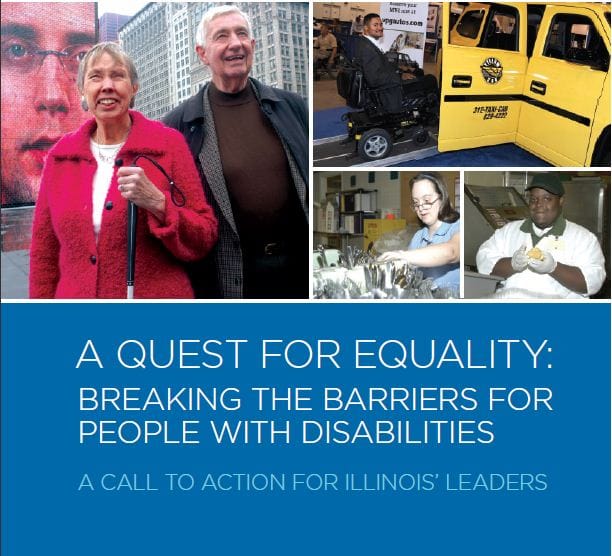Illinois to Disabled: Quality of Life Is Elsewhere
This month, the Chicago Community Trust's Persons with Disabilities Forum announced surprising findings regarding the quality of life the disabled can expect to enjoy in Illinois. In short: not much.

This month, the Chicago Community Trust's Persons with Disabilities Forum announced surprising findings regarding the quality of life the disabled can expect to enjoy in Illinois. In short: not much. Coinciding with the 20th anniversary of the landmark Americans with Disabilities Act (and in the shadow of an upcoming overhaul of federal ADA regulations), the Trust's new white paper, A Quest for Equality, takes a look at how well differently abled Illinoisans have fared in the past two decades.
According to the findings, compared nationally Illinois ranks at or near the bottom for quality of life indicators affecting the disabled including integrated living settings (our state's disabled live in a markedly high percentage of institutional settings), education settings (Illinois disabled youth tend not to get the chance to be educated with their non-disabled peers), and employment (in our state, the disabled are unemployed in disproportionate numbers.)
In fact, I'm personally unsurprised by all of this. When I first moved to Chicago from New York in 2003, I was shocked to discover how poorly residents with access challenges were accommodated by city and state departments of transportation during construction projects affecting sidewalks and streets. Unlike back in Gotham, to this day it is common in the Windy City to find streets, curb cuts, bus stops, and crosswalks completely blocked off by construction signs ordering (obviously only able) people to hop off mid-block curbs and wade through moving traffic with the familiar words, "Sidewalk Closed: Use Other Side."
Also not infrequent in this city of frigid winters are stores that lock their ADA doors, hanging signs telling people to use the revolving doors instead because it's "too windy" or "too cold" to allow the automated ADA door to remain operable. Federal law requiring those doors to operate, mind you, be damned. I once complained to the manager of a downtown Chicago supermarket about a locked ADA door. His mid-winter response? "Anyone in a wheelchair can knock on the window until a member of store staff hears them and lets them in."
That's entirely illegal but it does seem to fit with the Illinois mindset of satisficing problems. Trouble is, settling for a just-good-enough solution rarely satisfies the needs of all. Least of all, apparently, Illinoisans with access challenges.
As the report notes, there are many types of disability--ambulatory, cognitive, independent living, self-care, hearing, vision. The focus of much of my life having been on public-transit issues, it makes sense that I notice difficulties faced by the ambulatory disabled more than others. It was, however, disheartening to have this paper fill in the blanks for me in other areas that affect the more than 10 percent of Illinoisans who are differently abled.
To learn just how bad quality of life is for Illinois disabled and what the Trust suggests we do as a community in response, visit the Persons with Disabilities Fund website and consider reading the white paper (in PDF format.) If you reside outside of Illinois, be prepared to be shocked. If you're a fellow Illinoisan, the sad feeling of same old-same old won't come as a quite a shock. But come it will.




